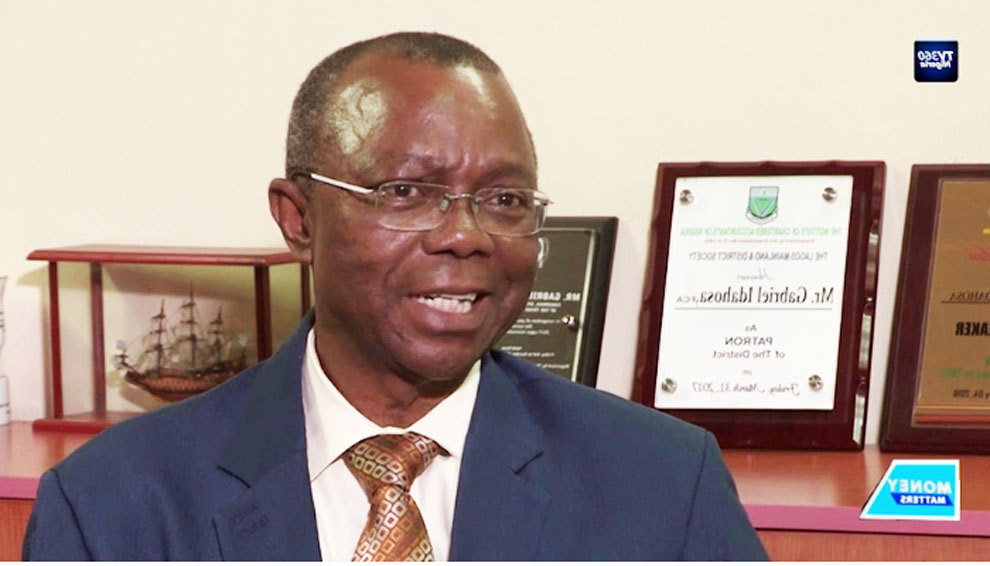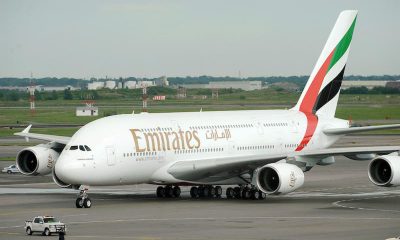Business
Marketers propose N720/litre, suspend fuel imports due to forex crisis

Marketers propose N720/litre, suspend fuel imports due to forex crisis
Oil marketers, on Sunday, indicated that the cost of Premium Motor Spirit, popularly called petrol, would rise to between N680/litre and N720/litre in the coming weeks should the dollar continue to trade from N910 to N950 at the parallel market.
They also hinted that dealers seeking to import PMS were being forced to put the plans on hold due to the scarcity of foreign exchange to import the commodity.
The warning came barely one week after the local currency crossed the N900/dollar ceiling, with the naira selling at over 945/dollar at the parallel market on Friday.
Oil dealers said the CBN Importers and Exporters official window for foreign exchange, which boast of a lower exchange rate of about $740/litre, had remained illiquid and unable to provide the $25m to $30m required for the importation of PMS by dealers.
This, they said, had led to the suspension petrol importation by dealers who were initially eager to import the commodity.
Operators told The PUNCH that the only marketer, Emadeb, who imported the commodity recently, was now finding it tough to recoup its investment due to the depreciation of the naira.
Senior officials of major oil dealers, who spoke to The PUNCH in separate interviews on Sunday, said PMS price hike was imminent unless the local currency appreciates in the coming weeks.
READ ALSO:
- We will prosecute ex-President Basoum for treason – Niger junta
-
20-year-old arrested for possession of three guns, motorcycle
-
APC replies Pastor Bakare, says he lacks authority to criticise Tinubu’s reform
Leaders of the Major Oil Marketers Association of Nigeria of Nigeria, Independent Petroleum Marketers Association of Nigeria, and Petroleum Products Retail Outlets Owners Association of Nigeria said there was a need for the Federal Government to intervene to address the crisis.
The National Public Relations Officer, Independent Petroleum Marketers Association of Nigeria, Chief Chinedu Ukadike, explained that the price of petrol was now driven by the fluctuations in forex, hence Nigerians should expect a hike soon.
Asked whether oil marketers were considering an increase in petrol price, he replied, “Once there is a slack in the naira against the dollar, there is going to be an effect. The demand and supply of forex is a key factor. We should also understand that it is not only petroleum products that use forex.
“Other manufacturers who import one thing or the other are also searching for dollars. So, the surge for dollars has continued to increase. So now that the dollar is hitting N910 to N940, and approaching N1,000, you should expect to buy PMS at the rate of N750/litre.
“It is simple mathematics, once the dollar is going up, have it in mind that the prices of petroleum products would definitely increase because the products are dollar-driven.”
Ukadike stated that oil marketers were still sourcing dollars from the parallel market, as the CBN’s Importers and Exporters official window was illiquid.
“Nigerians should brace for a price regime of between N680 to N720 if the exchange rate stays around N910 to N950/$, but the price is going to hit N750 once the dollar rises to N1,000.
“This is because marketers still source dollars from the parallel market, and not only marketers but virtually all importers in Nigeria. There is no subsidy any more on petroleum products, so you expect the cost to fluctuate with the dollars,” he stated.
The IPMAN PRO also stated that the Nigerian National Petroleum Company Limited was still the major importer of petrol into Nigeria, though another importer, Emadeb, imported the commodity recently.
“NNPC is still the major importer for now. One other company, Emadeb, imported products recently, but because this product is being sold in naira, getting back their funds is another issue since the naira keeps depreciating, while PMS imports is in dollars.
READ ALSO:
-
SERAP sues N’Assembly over N40bn budget for exotic, bulletproof cars
-
Two arrested for raping 11-year-old girl in Imo
-
Pastor Bakare attacks APC, Tinubu’s economic policies as anti-people
-
We sacked Bazoum to save Niger, Nigeria – Niger Military junta tells Nigerian Muslim clerics +photos
“This is why it is often difficult to go back and buy again as an independent importer. That is the problem we are facing,” Ukadike stated.
On when Nigerians would start seeing the price increase, he said, “NNPC is like the sole distributor of petroleum products now, so once you see a change in the price of petrol at their outlets, then other marketers will implement it.”
Punch
Marketers propose N720/litre, suspend fuel imports due to forex crisis
Business
Over 60% firms, individuals not paying tax, says LCCI president, warns against overtaxing

Over 60% firms, individuals not paying tax, says LCCI president, warns against overtaxing
President and Chairman of Council, Lagos Chamber of Commerce and Industry LCCI, Gabriel Idahosa, has cautioned against the multiplicity of taxes by the Federal Government, saying the development was not good for the economy. Speaking on an Arise television show monitored in Abuja, Idahosa said it was not possible to begin to raise money for every little thing in government.
He said the federal government should instead increase the capacity of the Federal Inland Revenue Service FIRS to collect taxes, noting that not up to 40 percent of taxable persons and organizations were taxed. According to him, the countries that are most efficient in tax collection are the countries that have the minimum number of taxes.
His words: “It is not really possible to begin to raise money for every little thing in government. To levy for cyber security, industrial training, insurance, levy for police trust fund and others, the whole approach in recent times of trying to put levy on everything is simply not the way to manage public finance in any country.
“The business of raising revenue for government is assigned to a specific organization in government which is the Federal Inland Revenue Service FIRS in the case of Nigeria. It is the business of the FIRS to get revenue for all the services of the Federal Government of Nigeria. The countries that are most efficient in tax collection are the countries that have the minimum number of taxes.
READ ALSO:
- No worker can survive on less than N100,000 minimum wage – Shehu Sani
- DSS manhandles two workers in N’Assembly
- 11 pipeline vandals arrested in Benue
It has been established during the time of the Taiwo Oyedele Tax Reform Commission that some of the levies and taxes that you create does not translate into significant increase in revenue and in any country, the agencies in charge of activities like these, whether it is high level intelligence or security, are funded from the budget of the country and the way they are funded usually is not a matter for public conversation. Nobody exposes the way the intelligence agencies of countries are funded.
“The technical issue of whether the Act was correct or not is minor. The big issue is should government of Nigeria encourage all agencies to be coming with all manner of levies for every single thing. You want something on health and you have a levy, in security you have a levy etc. That should be the more important conversation, that there should be a concerted effort to increase the capacity of the FIRS to do the job of revenue collection.
As we speak, not up to 40 percent of taxable persons are taxed. The first thing to do is to bring all taxable people into the net and then tax them accordingly. You don’t even need to raise the tax. More than 60 percent of taxable organizations and individuals are not paying tax. That should be the focus. The first level of taxation is identity. Identify economic actors at all levels right to the remotest villages.
The capacity of the FIRS to reach tax payers across the country was not built over time but with the dwindling of oil revenue, that capacity has been increased. You are beginning to see FIRS offices in several parts of the urban areas and state capitals but more than 60 percent of Nigerian businesses are not in the urban areas or state capitals. Any country that wants to collect tax, has to go very granular. Businesses that exist in every village must be taxed and that is where the FIRS is moving slowly but steadily”, he stated.
Over 60% firms, individuals not paying tax, says LCCI president, warns against overtaxing
Aviation
FAAN begins sale of e-tags at airports

FAAN begins sale of e-tags at airports
The Federal Airport Authority of Nigeria (FAAN) on Friday commenced the sale of electronic tags (e-tags) at airports.
The initiative, it said in a statement, was in line with the presidential directive that mandating the use of e-tags for accessing the nation’s federal airports.
“Following the presidential directive that all citizens are mandated to pay for e-tags at all the 24 federal airports across the country, we wish to inform the general public that the e-tags are available for sale from Friday, 17th May, 2024 at the following locations,” FAAN said.
“Lagos: Murtala Muhammed International Airport Lagos, Terminal 1, 5th Floor) Office of HOD Commercial. Contact: 08033713796 or 08023546030.
“Abuja: Nnamdi Azikiwe International Airport, HOD Commercial Office (General Aviation Terminal) Contact: 08034633527 or 08137561615.”
FAAN however said there would be an option to pay in cash at the access gates for motorists without e-tags.
On May 14, Minister of Aviation and Aerospace Development, Festus Keyamo, announced that everyone, including the President and Vice President, would pay tolls at the airports.
Keyamo said the government was losing over 82 per cent of the revenue it should have earned from the access fee.
Business
Your pension funds safe, won’t be accessed illegally, FG tells workers

Your pension funds safe, won’t be accessed illegally, FG tells workers
Minister of Finance and Coordinating Minister of the Economy, Mr. Wale Edun, says the Federal Government has no plans of illegally accessing the N20 trillion pension funds for infrastructure development.
He said noone should entertain any fear over the safety of the contributions of workers that make up the pension funds.
Edun had earlier said the spoken on a move to use the pension funds as part of the government’s efforts to bridge Nigeria’s estimated 20 million housing deficit, and provide massive housing and mortgage loans at 12 per cent interest rates, with 25-year repayment plans.
The minister’s comments had elicited serious reactions from notable groups and Nigerians, including the organised labour and a former Vice President, Alhaji Atiku Abubakar, who advised the government to suspend the move.
Atiku said the move was potentially disastrous for retired Nigerians dependent on their pensions.
But in a statement personally issued on Thursday, Edun said the stories making the rounds that the government planned to illegally access the savings and pension contributions of workers were false.
He stated that the pension industry was guided by rules, adding that the government would be strictly guided by extant rules in accessing the pension funds of workers.
The minister stressed that government would not go outside the stipulated limitations on what the funds could be invested in.
The statement read in partu, “It has come to my notice that there are stories making the rounds that the Federal Government plans to illegally access the hard-earned savings and pension contributions of workers. Nothing could be farther from the truth.
“The pension industry, like most the financial industries, is highly regulated. There are rules. There are limitations about what pension money can be invested in and what it cannot be invested in.
“The Federal Government has no intention whatsoever to go beyond those limitations and go outside those bounds, which are there to safeguard the pensions of workers.
“What was announced to the Federal Executive Council was that there was an ongoing initiative drawing in all the major stakeholders in the long-term saving industry, those that handle funds that are available over a long period to see how, within the regulations and the laws, these funds could be used maximally to drive investment in key growth areas, including infrastructure, housing, and, of course, to find a way to provide Nigerians with affordable mortgages.
“Within this context, there is no attempt, nor is it being considered, to offer unsafe investments for pension funds or even insurance funds or any investment funds.
“No attempt whatsoever to increase the risk. No attempt whatsoever to lower the returns that would otherwise be earned.”
-

 News2 days ago
News2 days agoUsing pre-registered SIM card may land you in jail, NCC warns
-

 metro2 days ago
metro2 days agoFire guts new NNPCL tank farm in Lagos
-

 International3 days ago
International3 days agoUK says it’s developing radio frequency to blast out drones
-

 News2 days ago
News2 days agoPolice grill Osun monarch, Ataoja of Osogbo, over petition
-

 News3 days ago
News3 days agoUpdated: Reps condemn assault on Nasarawa female doctor by patient family
-

 Sports4 hours ago
Sports4 hours agoFlamingos thrash Burkinabe Girls 6-0 in U-17 World Cup qualifier
-

 Aviation3 days ago
Aviation3 days agoUpdated: We’ll resume Lagos-Dubai flights on October 1, says Emirates
-

 metro1 day ago
metro1 day agoUpdated: Many injured, shops destroyed in truck, BRT bus crash on Lagos-Ibadan Expressway (PHOTOS)




















